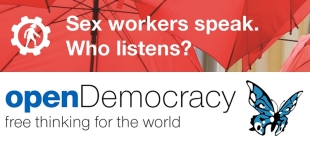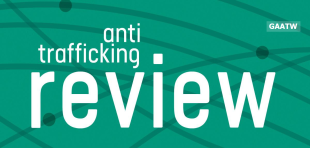Appeal FOR Prostitution*
*To strengthen the rights of sex workers and to improve their living and working conditions
The following is the English version of an Appeal FOR Prostitution by the Trade Association Erotic and Sexual Services (Berufsverband erotische und sexuelle Dienstleistungen) in Germany. It is a response to an appeal by leading German anti-prostitution activist Alice Schwarzer and her magazine Emma.
Please read, spread and sign the appeal to support German sex workers!
 Prostitution is not slavery. Prostitution is an occupation, where sexual services are offered in exchange for payment. Such transactions are based on the voluntariness of the parties involved. Without consent to sexual activities, there is no prostitution, since sex against a person’s will is rape. The latter is a criminal offence, even if money changes hands.
Prostitution is not slavery. Prostitution is an occupation, where sexual services are offered in exchange for payment. Such transactions are based on the voluntariness of the parties involved. Without consent to sexual activities, there is no prostitution, since sex against a person’s will is rape. The latter is a criminal offence, even if money changes hands.
Prostitution is not a synonym for human trafficking. Not only German but also migrant sex workers are predominantly working as sex workers self-determinedly and by choice. To flatly label sex workers, regardless of their ethnicity, as victims is an act of discrimination.
Although often described as the world’s oldest profession, prostitution is hardly anywhere recognised as work. To the contrary: in most parts of the world, sex workers are persecuted, ostracised, and excluded from society. That is why sex workers around the world demand the decriminalisation of sex work and its recognition as an occupation.
The German parliament adopted this idea when it passed the Prostitution Act of 2002 (ProstG). Their legal recognition improved the situation of sex workers in Germany. They are now able to sue employers for lost wages and have access to the social security and health care system. In addition, the provision of good working conditions and rooms are no longer punishable as “procurement of prostitution”. However, the law did not change the right of the police to enter premises used for prostitution at any time, and the number of raids has increased ever since.
The Prostitution Act of 2002 has some weaknesses and requires a reform. The main problem, however, isn’t the law itself but the lack of implementation in specific federal states.
Contrary to common claims, the Prostitution Act has not led to an increase in human trafficking in Germany. As progress reports by the Federal Criminal Police Office (BKA) have shown, the number of identified victims of human trafficking has even decreased since the adoption of the law. In New Zealand, where prostitution is recognised as work since 2003, no increase in human trafficking has been registered either.
Among the factors that abet human trafficking are global inequality, restrictive migration laws as well as the lack of rights by parties affected. A successful fight against human trafficking requires comprehensive structural reforms on a global level and a human rights based approach.
The criminalisation of customers who make use of erotic services is unsuitable to solve these problems. While the so-called “Swedish Model” has displaced visible street prostitution, there is no evidence that it has reduced prostitution itself or human trafficking. Meanwhile, the working conditions for sex workers have worsened and Denmark and Scotland have already rejected the adoption of the “Swedish Model”.
Therefore we demand:
● The involvement of sex workers in political processes that deal with the subject of prostitution
● No further expansion of policing powers and no supervision by the State or curtailing of civil liberties
● No criminalisation of our customers under the Swedish Model or any other law
● Information instead of prohibition, government-funded further education for sex workers
● Campaigns against stigmatisation and for respect for sex workers
● Right of residence, compensation and comprehensive support for people affected by human trafficking
Signatories
Click here to see the list of signatories and sign the appeal.
Fill in your name, and add your occupation/organisation (Beruf/Organisation) and location (Ort) if you wish. If you wish to receive the BesD newsletter (German), please add your email address, too.
Berufsverband erotische und sexuelle Dienstleistungen
(Trade Association Erotic and Sexual Services)
Tuesday, October 29th, 2013
Translation: Matthias Lehmann. Research Project Korea.








Pingback: Llamamiento A FAVOR de la prostitución* | El estante de la Citi